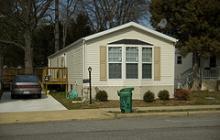
Shelterforce has used “manufactured housing” pretty consistently for over a decade, as well.
But here’s the problem—the stigma hasn’t gone away, and yet no one knows what we’re talking about.
Readers of Shelterforce are probably more likely than the general public to understand it, but when I did some informal polling of my peers, I found practically no one who understood the term “manufactured housing.” They thought it meant modular housing, or housing with some prefab components.
If you aren’t reaching people, then you can’t change their minds. When I suggested that the terminology was obsuring the communications efforts at a panel on communications at the I’M HOME manufactured housing conference in Seattle in November, I was surprised that it came as a surprise. But sometimes we all spend so much time in our worlds that we don’t realize our most basic terms are jargon to others. I’ve been guilty of that certainly.
Fascinatingly, some of the attendees at that panel then volunteered that some of the residents of the manufactured home communities they lived in or worked with also referred to them, “stubbornly,” as mobile homes or trailers. The room was divided as to whether these residents should be evangelized out of using these words, or whether maybe the issue was more whether they were using it with pride or shame. It wouldn’t be the first negative term reclaimed as a term of pride.
I think in the long run, those terms will and should fall away, as they aren’t accurate. But in the meantime, it might behoove those working in this space to not be quite so afraid of them—they might be necessary as a bridge to get the word out to people who know nothing of the 1979 HUD Code and energy efficiency breakthroughs, chattel vs mortgage loans, or the fact that residents are increasingly buying their communities and running them as co-ops. (I also suggest, as an alternative, “single-wide”/“double-wide,” which are both more accurate in their noun form without ‘trailer’ and well-known, though perhaps still stigmatized.)
Witness what two very sympathetic articles were recently titled: The Atlantic‘s The Case for Trailer Parks, and Pacific Standard‘s How the Trailer Park Could Save Us All. I guarantee you, without having spoken with them about it, that the editorial teams in both places knew they were using a loaded term, and knew that if the articles ran with “manufactured housing” in the titles they would see a fraction of the readership, and therefore change a fraction of minds.
We had the same thought process when we titled our our Shelterforce Weekly e-newsletter last week, which linked to our own piece “Manufactured Housing—Underutilized and Misunderstood.” We put “Don’t Trash Trailers” in the subject line.
After all, if you don’t have someone’s attention, you can’t make your case to them.





Comments